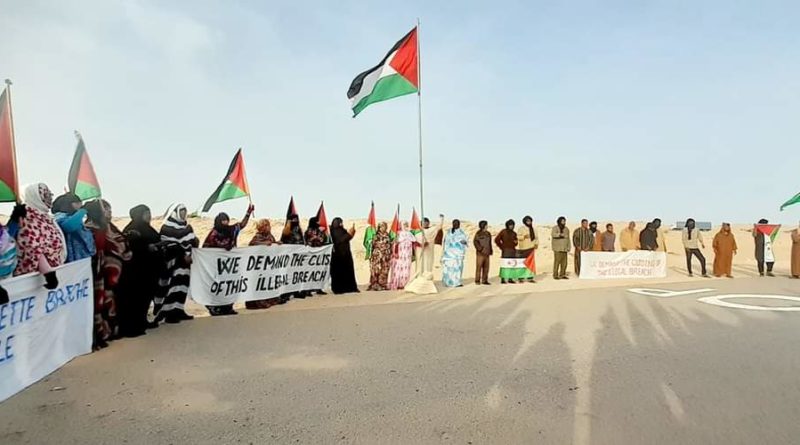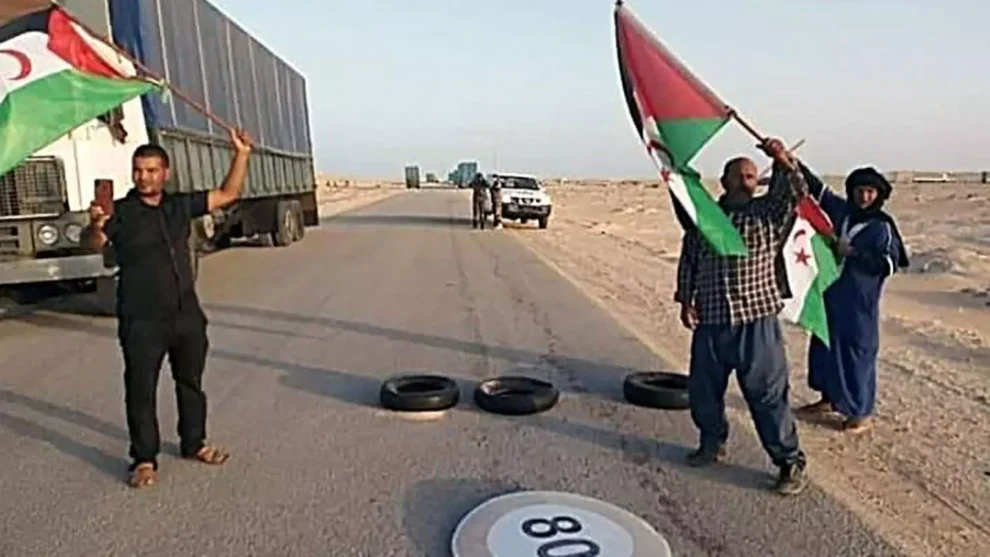

After three weeks of peaceful demonstrations organized by Sahrawi citizens in the area HergeratIn southern Western Sahara, where they were blocking the passage of trucks transporting looted Sahrawi resources to African countries, the Moroccan army attacked protesters in the early hours of November 13, breaking a twenty-nine-year ceasefire agreement.
The event began with an underestimation of the Polisario Front’s response and an attempt to impose a new reality that would force the two colonial powers in the region: Spain And Francesupport Morocco resolve the conflict in their favor and exert popular pressure on Front Polisario weaken it.
Why El Guerguerat?
Morocco turned the area into a transshipment point for its goods and products to the African market as an alternative to air travel, the prospects of which had diminished with the collapse of the allied systems, which had previously been an economic relief and a strong support for control of their cells. , which are nothing more than destructive hands to justify the French colonial presence.
These transformations are a sign of profound changes in the region.
Thus, El Guergerat has become a strategic alternative for the servant of Western interests in the region through which its products pass, from processed hemp to looted resources from West Saharato strengthen its presence and dominance in the region.
While France seeks to maintain the current situation and strengthen the position of its functional ally to guarantee its dominance in West Africa, Spain, thanks to its political elite on the right or left, views the proximity of the “failed state” as a threat. .for its security, stability and economic weakening.
These motives have underpinned the political approaches of France and Spain towards Morocco for decades, and both countries have supported Morocco’s position on Western Sahara.
In the context of regional changes and transformations
France’s influence has clearly diminished and led to significant changes in political and economic dynamics as the four riparian countries seek alternative allies (Central Africa, Mali, Burkina Faso and Niger).
These transformations are a sign of profound changes in the region, indicating a real desire for independence and sustainable development, away from decades of economic exploitation.
These changes represent an important transition on the regional stage and are a sign of a shift in the heart of the African Sahel towards independence and strengthening sustainable development.
Slow change is obviously conscious, reflexive and precise in its decision-making, it serves the interests of the people of the new elite, who position themselves as revolutionaries in a new era, who break with the past and establish new policies that look forward to a brighter future. the future of these countries, although it may seem like an adventure for “reasonable pragmatists” who are afraid of mountains and prefer to live in holes.

Liberation values in Africa
The struggle in Western Sahara has a major impact on the liberation values of Africa as a whole. This struggle reflects the commitment to human rights and self-determination that were fundamental to previous liberation movements on the African continent.
Sahrawis seek to change the position of the international community
Liberation values are concerned with the protection of human dignity and the rights of people to determine their own destiny. The Sahrawis’ persistence in fighting for their rights is therefore consistent with the values of these historical movements. The Sahrawis are seeking to change the position of the international community, which has remained silent for more than 30 years in the face of violations of international law and ethics by Morocco and its allies. Support for this struggle reflects the possibility of achieving real change in Western Sahara and its struggle for justice and freedom.
Liberation values in Africa have a deeper meaning in the context of Western Sahara, where they represent an important fulcrum for achieving continental solidarity and strengthening the ability of peoples to determine their own future. This was previously supported African Union and today is further strengthened by an Africa free of any Western influence or domination. The Sahrawi resistance is presented as a noteworthy example of how emancipatory values can form the basis of change and development in the context of continental conflict.
Influential Role
It highlights the role of powerful actors who can steer events in Western Sahara towards independence and justice. South Africa, with its distinguished history in the fight against apartheid and its injustices, is an inspiring model that promotes the values of liberation and plays a vital role in supporting Western Sahara, whether through diplomacy or providing political and financial support.
On the other hand, Algeria plays a central role as a regional organizer and defender of people’s rights, given its distinguished record of fighting colonialism and dealing with its consequences in Africa. Since independence, it has maintained close relations with all African liberation movements, including the African National Congress, and views its position on the Sahara issue as a continuation of this view, despite various pressures exerted by Western powers.
The influential role also extends to the international community, where countries and international institutions can play an effective role in seeking a just settlement and supporting the right of the Sahrawi people to self-determination. Cooperation at the local, regional and international levels can have a significant impact on moving Western Sahara towards a future of peace and justice.
Return to sovereignty
After 47 years of invasion and occupation of Western Sahara, Morocco has not achieved its goals. Despite their partial demands for Western Sahara, such as dividing it into Mauritania and occupy the part from which the latter had left, could not persuade the West to firmly support its claims to this region. At the very least, Western powers are not eager to openly declare their support for Morocco, which is forced to threaten the loss of its interests to all countries that do not recognize its sovereignty over Western Sahara.
Western Sahara deserves to be a place where people fully regain their rights.
Political blackmail has persisted for decades, but today it falls on deaf ears, especially after the international community has realized that the Sahrawis are seriously compromised in returning to their homeland. This could create a new source of tension, weakening Western efforts to contain the rising powers lurking around every corner to weaken Western colonial influence and restore a multipolar world.
In conclusion, the restoration of sovereignty by the Sahel countries reflects the continuation of the struggle against colonial rule and exploitation. These changes require determination to build strong institutions and raise awareness of emancipatory values and human rights. Western Sahara deserves to be a place where people regain their full rights and sovereignty after decades of colonial rule and exploitation, and represents a cornerstone for understanding current struggles in the African region. Collaboration of local, regional and international efforts can have a significant impact on leadership.
Ahmed Ettanji He is a Sahrawi journalist and human rights activist, and the president of Equipe Media.
Source: El Independiente